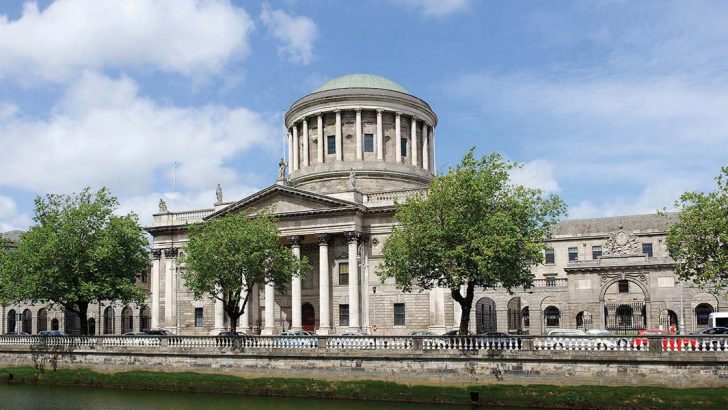The View
For the last 14 years, I have raised our children at home and educated them. It is wonderful, fulfilling, and often exhausting. I have a loving, supportive husband who – since the children were very small – has taken them almost every Saturday to allow me some time off and headspace. I like to get out of the house, go to Mass, meet a friend, do some errands and indulge in my greatest treat: having breakfast in a café, sitting alone with a book. On one such occasion, I was in a restaurant and, unbeknownst to me, an LGBT activist was watching me. Later I saw the tweet that he fired off: “Saw Maria Steen say grace in a restaurant before she ate her meal. Almost asked her to stop flaunting her lifestyle in my face.”
Like most Irish Catholics, my attempt at blessing myself and saying my grace falls into the “shyly-done” category, rather than the “flaunting it category”, but I do try to remember to give thanks to God for the blessing of being able to eat good, nutritious food in comfortable surroundings when so many others around the world cannot. However, this simple act done while sitting alone in a restaurant full of strangers was clearly an affront to this man. It was one small example of the growing intolerance towards religious freedoms.
Another example that comes to mind is the statement on Twitter by Minister Simon Harris directed against Bishop Kevin Doran, who had the temerity to address a room of Catholics and restate Church-teaching contained in Humanae Vitae. Minister Harris, despite not being present at the conference, tweeted: “Please just make it stop! Increasing access to & availability of contraception is and will remain public health policy. Religion plays an important role for many on an individual basis — but it will not determine health and social policy in our country any more. Please get that.”
Rights
In the hierarchy of rights, the right to the free and public profession and practice of religion should rank highly. Yet there is a sense that religious freedom is fast becoming a second-tier constitutional right. Many Catholics and other supporters of the right to life experienced this during the abortion referendum campaign. Not merely did our opponents disagree with us; they tore down our posters and actively sought to prevent our message from even being articulated, as when they tried to bully hotels into cancelling bookings for pro-life meetings. In cases on this and the neighbouring island, Christians have seen their businesses and careers threatened because they professed their religious convictions. And in the ongoing Covid epidemic, the attitude of Government and NPHET, as expressed by Deputy Chief Medical Officer, Ronan Glynn, has been that religious freedoms and the freedom to worship publicly are “less important” than many secular activities.
Test
Justice Samuel Alito, of the United States Supreme Court, in a recent address to the 2020 National Lawyers Convention, remarked that “the pandemic crisis has served as a kind of constitutional stress test”. Indeed it has. The sweeping powers assumed by governments across the world over their citizens are unprecedented outside wartime. Most of us have gone along with these restrictions, trusting in our leaders that the measures were absolutely necessary. Nine months into the emergency, we have just come out of a second lockdown and many acknowledge the possibility of a third after the Christmas season.
Laws – particularly those given by executive order, without reference to the normal scrutiny of the legislative process – can be abused. And Covid-19 restrictions in many jurisdictions, including this one, have ridden rough-shod over important constitutional rights, including religious freedom and the right to public worship. An emergency, no matter how serious, cannot be an excuse to ignore fundamental rights.
Recent court decisions support this view. In a case brought by the Catholic Diocese of Brooklyn against the Governor of New York, a majority of the US Supreme Court held that strict restrictions on religious gatherings were unjustified and disproportionate.
Similarly, in Geneva, the Court of Justice held that, while there was an important and even vital public health interest involved in the context of the pandemic, the Council of State’s imposition of restrictions on religious services offended against the principle of proportionality. In other words, interference with an important right such as the right to public worship must be no greater than is necessary.
Here we have two highly secular countries (the United States and Switzerland) defending citizens’ rights – and the rights of religious congregations – to profess their religion publicly and in a manner of their own choosing. Neither court suggested that these rights are unlimited – no rights are – but rather that infringements of the rights must be anxiously scrutinised and carefully justified.
Freedom
In a post-Catholic Ireland, or a post-Christian western world, why should religious freedom matter? The answer, I believe, is because religious freedom is closely related to freedom of conscience, thought and expression. The idea that the State can or should restrict one’s conscience and religious practices, thoughts, and alliances is utterly oppressive and is associated with tyrannical and totalitarian regimes. The freedom to practise one’s religion or state one’s religious views only by whispering those views in one’s own home is no freedom at all.
At the time the Irish Constitution was ratified by the people, in 1937, the religious freedoms it guaranteed were probably thought likely to be required by members of minority sects, rather than the majority of Catholics. However, perhaps recognising that Irish independence had been the common cause of men and women of many religious traditions, the drafters of the Constitution did not seek to establish the Catholic Church as a State religion and, in the same article, expressly guaranteed, to every citizen, not merely the free profession and practice of religion, but also freedom of conscience.
We now inhabit a country that would be unrecognisable to the leaders of the independence era, in which the profession of the Catholic faith is not merely a minority view, it is treated by many in positions of power with disdain, as antithetical to their own, so-called “progressive” beliefs. It is now that, for Catholics, the constitutional protections really matter. It is only when you are a minority voice and the majority is against you that a right has to be relied upon, and must be upheld by the courts, even in the midst of an emergency.


 Maria Steen
Maria Steen The Four Courts in Dublin.
The Four Courts in Dublin. 